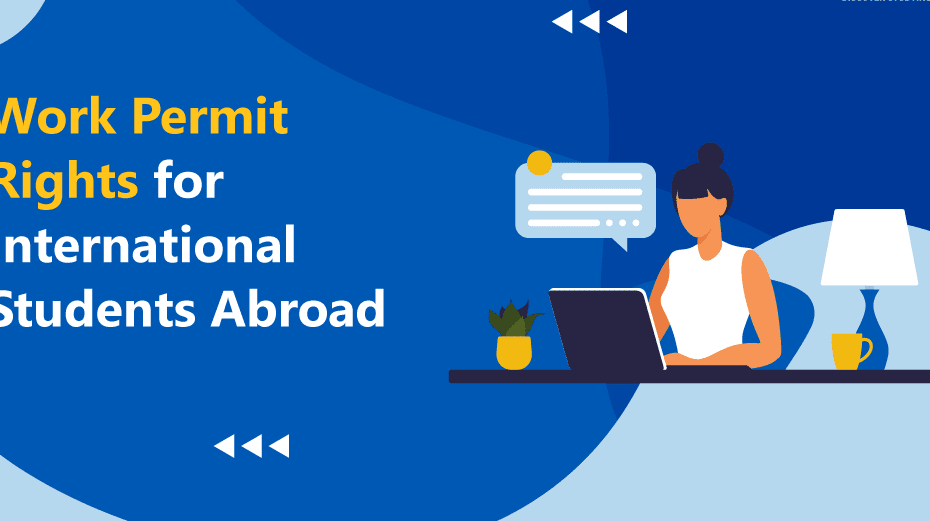Studying abroad can be an exciting and enriching experience, but it can also be expensive. To help offset some of the costs associated with studying in a foreign country, many international students seek part-time employment while they are studying.
However, in most countries, it is illegal to work without a work permit. Therefore, obtaining a work permit is a crucial step for students who wish to work while studying abroad.
A work permit is a legal document that allows international students to work part-time while studying in a foreign country. Without a work permit, students risk being fined, deported, or even banned from entering the country in the future.
Additionally, having a work permit can provide students with valuable work experience, help them to develop new skills, and enhance their resumes.
In this article, we will explain the process of applying for a work permit as a student studying abroad. We will discuss the different types of work permits available, the eligibility criteria for obtaining a work permit, and the limitations of a work permit.
We will also provide tips for researching work permit requirements, preparing a successful application, and applying. Finally, we will emphasize the importance of obtaining a work permit and encourage students to seek assistance if needed.
Understanding the Work Permit Process
A work permit is a legal document that allows international students to work part-time while studying in a foreign country. In general, work permits are issued by the government of the country in which the student is studying.
There are generally two types of work permits available for international students: on-campus work permits and off-campus work permits.
On-campus work permits:
These permits allow students to work on campus for a maximum of 20 hours per week during the academic year, and up to full-time during breaks between academic terms.
Off-campus work permits:
These permits allow students to work off-campus for a maximum of 20 hours per week during the academic year, and up to full-time during breaks between academic terms.
To be eligible for an off-campus work permit, students must meet certain criteria, such as being enrolled full-time in an eligible program, maintaining satisfactory academic standing, and having a valid study permit.
Would You Like To Apply For This Jobs/Sponsorship?
Enter Your Email Address HERE & You Will Receive a Notification About Your Application. If it shows "Subscribed" CLICK HERE to follow on Telegram for updatesTo be eligible for a work permit, international students must meet certain criteria, such as being enrolled full-time in an eligible program, maintaining satisfactory academic standing, and having a valid study permit.
In addition, students must apply for the appropriate type of work permit and provide all necessary documentation, such as a letter of employment, a copy of their study permit, and proof of enrollment in an eligible program.
Limitations of a Student Work Permit
While a work permit can be a great opportunity for people to experience new cultures and gain valuable work experience, it is important to understand its limitations. It is important to understand that a work permit is not a guarantee of permanent residency or citizenship in the country where it is issued.
Work permits are temporary and will expire after a specified period. Additionally, work permits may have limitations on the type of work that can be performed or the number of hours worked. It is important to thoroughly understand the terms and conditions of a work permit before accepting a job offer or beginning work.
- Limited duration: A work permit is valid for a specific duration, which is usually tied to the job offer. Once the permit expires, the individual must either leave the country or apply for an extension.
- Limited job scope: The work permit specifies the type of job an individual can do and the employer they can work for. If they want to change jobs or employers, they may need to apply for a new work permit.
- Limited geographic scope: A work permit is usually valid only for a specific geographic area within a country. If an individual wants to work in another part of the country, they may need to apply for a new permit.
- Limited travel: Depending on the terms of the permit, an individual may not be allowed to leave the country or may be required to obtain a re-entry permit to return.
- Dependence on the employer: The individual’s ability to work in the country is often tied to their employer. If they lose their job, their work permit may become invalid, and they may need to leave the country.
Researching Work Permit Requirements
The next step is to research the work permit requirements. This can be a complex process, as requirements may vary widely between countries and may be subject to change.
Here are some general steps to follow and resources to consult when researching work permit requirements for different countries:
- Contact the embassy or consulate of the country you are visiting to determine their student work permit requirements.
- Research the relevant government agencies in the country you are visiting to understand the process and requirements for obtaining a student work permit.
- Ask your educational institution about the student work permit requirements for the country you are visiting, as some may have specific requirements for those enrolled in certain courses.
- Consider consulting a lawyer or immigration specialist that is familiar with the country’s laws and regulations regarding student work permits.
- Visit the website of the country’s immigration department or labor office to research the requirements and process for obtaining a student work permit.
- Ensure that you comply with all of the requirements, including providing all of the necessary documentation and submitting the necessary fees.
- Follow up with the relevant government agencies to ensure that your application is being processed and that you have met all of the requirements.
Resources to Consult:
- The website of the country’s immigration department or labor office
- Your educational institution
- A lawyer or immigration specialist
- The embassy or consulate of the country you are visiting
Overview of work permit requirements for students in various countries.
Work permit requirements vary widely by country and depend on factors such as the type of work, the duration of the employment, the nationality of the worker, and the visa requirements for the country. Here is an overview of work permit requirements for students in various countries:
- United States: International students in the United States are allowed to work on-campus for up to 20 hours per week during the school year and full-time during school breaks. They need to apply for a Social Security number and work authorization from their university’s international student office. Off-campus employment is also available under certain circumstances, but students must obtain permission from the U.S. Citizenship and Immigration Services (USCIS).
- Canada: International students in Canada are allowed to work part-time on-campus without a work permit. However, they need to obtain a work permit to work off-campus. To be eligible, students must have a valid study permit, be enrolled full-time at a designated learning institution, and have been studying for at least 6 months.
- United Kingdom: International students in the UK can work part-time for up to 20 hours per week during term-time and full-time during holidays. They do not need a work permit, but they must have a Tier 4 (General) student visa and be studying at a recognized institution.
- Australia: International students in Australia can work part-time for up to 40 hours per fortnight (two weeks) during term-time and full-time during holidays. They do not need a work permit, but they must have a student visa and be enrolled in a registered course.
- Germany: International students in Germany can work part-time for up to 120 full days or 240 half days per year without a work permit. However, they need to obtain a work permit to work more than this. To be eligible, students must have a student visa and be enrolled in a recognized institution.
- France: International students in France are allowed to work part-time for up to 964 hours per year without a work permit. However, they need to obtain a work permit to work more than this. To be eligible, students must have a student visa and be enrolled in a recognized institution.
It’s important to note that work permit requirements can vary depending on the country, and it’s always best to check with the relevant government agency or the international student office at your institution for the most up-to-date information.
Preparing Your Application
After knowing the requirements, the next step is to prepare your Application.
Gathering Necessary Documents and Information:
When preparing your work permit application, it’s important to gather all the necessary documents and information to ensure a smooth and successful process. Here are some documents and information you may need:
- Your passport or other valid identification documents.
- Your student visa or other relevant visa documents.
- Your academic transcripts and enrollment certificate from your school.
- A letter from your employer stating your job offer and work hours.
- Proof of your language proficiency, if required.
- Any other relevant documents related to your work permit application.
Tips for filling out a work permit application:
- Read the instructions carefully and fill out the application accurately.
- Ensure that all information is up-to-date and consistent with your other documents.
- Be honest and provide detailed information, including any previous work experience or education.
- Be prepared to provide additional information or documents, if requested. Check the application for completeness and accuracy before submitting it.
Understanding the application timeline:
The application timeline for a work permit can vary depending on the country and type of permit. Here are some general timelines to keep in mind:
- Start early: It’s best to start your application process as soon as possible to allow for any potential delays or issues.
- Processing time: The processing time for a work permit application can range from a few weeks to several months. Be sure to check the specific processing times for your country and type of permit.
- Biometrics appointment: Depending on the country, you may need to attend a biometrics appointment to provide your fingerprints and photo. This appointment may add additional time to the application process.
- Follow-up: If you haven’t received a decision on your application after the estimated processing time, you may want to follow up with the relevant government agency or your international student office.
Overall, it’s important to be patient and thorough when preparing your work permit application. By gathering all the necessary documents, filling out the application accurately, and understanding the application timeline, you can increase your chances of a successful outcome.
Submit Your Application
Submitting your application for a student work permit can vary depending on the country and type of permit. Here are some general steps to keep in mind:
- Complete your application and gather all necessary documents and information.
- Pay any required fees.
- Submit your application online or by mail, depending on the country and permit type.
- Attend a biometrics appointment, if required.
- Wait for a decision on your application.
Tips for submitting a successful work permit application:
- Double-check your application for completeness and accuracy before submitting.
- Submit your application as early as possible to allow for potential delays or issues.
- Follow the instructions for submitting your application and provide all necessary documents and information.
- If submitting by mail, use a tracked and secure delivery method.
- Keep copies of all application materials for your records.
Conclusion
In conclusion, obtaining a work permit is crucial for anyone who wishes to work legally in a foreign country. A work permit ensures that individuals have the legal right to work and earn money in that country while also protecting them from exploitation and discrimination in the workplace.
To increase your chances of obtaining a work permit, it is essential to research the requirements and application process thoroughly. Be sure to provide accurate and complete information and submit all necessary documents in a timely manner. Additionally, it is crucial to remain patient throughout the application process, as it can take some time to receive a response.
Finally, if you are struggling to navigate the work permit application process or have questions about the requirements, do not hesitate to seek assistance. Many resources are available, including immigration lawyers, embassy officials, and online forums. Seeking help can increase your chances of success and make the process less stressful. Good luck with your work permit application!






